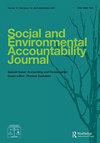论中国灭绝会计的解放性
Q2 Business, Management and Accounting
Social and Environmental Accountability Journal
Pub Date : 2021-03-16
DOI:10.1080/0969160X.2021.1889386
引用次数: 10
摘要
摘要大多数关于生物多样性和保护的企业报告研究通常得出结论,这种报告主要由印象管理、企业自身利益和以人类为中心的心态主导。这导致许多研究人员忽视了公司报告,越来越多地关注非政府组织、公共部门和政府层面的报告活动。然而,最近的工作探索了公司报告(以及其他实体的报告)包含解放要素的潜力,这些要素至少表明了在改善保护、加强生物多样性保护以及至关重要的是防止物种灭绝的意义上具有变革性和解放性的意图。灭绝会计提供了公司如何保护/恢复栖息地、增强生物多样性以及采取动态保护方法的详细信息,这可能会导致生态和环境的改善。到目前为止,中国上市公司还没有受到研究人员对灭绝会计的关注。本文试图分析高生态影响行业的中国上市公司的广泛样本,以评估其生物多样性披露在多大程度上受印象管理的支配,从而确定报告中任何可以被解释为解放灭绝会计的元素。鉴于这一领域的研究很少,我们回应了文献中关于研究发展中经济体公司灭绝会计的呼吁。我们的研究结果表明,尽管公司在披露中强烈倾向于揭示印象管理和自身利益,但也有解放灭绝会计的例子,它们似乎正在引发其保护行为和活动的真正转变。此外,我们将特定物种、以物种为中心的报告确定为灭绝核算的一个重要组成部分,证明了解放灭绝核算在实践中的发展和演变方式。这代表着对现有文献的重大贡献,因为之前对采矿业的研究发现,只有以人类为中心的“合法性”主导了灭绝核算。令人鼓舞的是,在发展中经济体的高影响力部门的报告实践中,解放灭绝会计的元素开始出现。本文章由计算机程序翻译,如有差异,请以英文原文为准。
Assessing the Emancipatory Nature of Chinese Extinction Accounting
ABSTRACT The majority of research into corporate reporting on biodiversity and conservation generally concludes that such reporting is dominated by impression management, corporate self-interest and an anthropocentric mindset. This has led many researchers to dismiss corporate reporting, focusing increasingly on the activities of NGOs, the public sector and government level reporting. However, recent work has explored the potential for a corporate reporting (and reporting by other entities) to encapsulate emancipatory elements, where such elements demonstrate at least an intention to be transformative and emancipatory in the sense of improving conservation, enhancing biodiversity protection and, critically, preventing species extinctions. Extinction accounting that provides details on how a company is protecting/restoring habitat, enhancing biodiversity, and taking a dynamic approach to conservation could, potentially, lead to ecological and environmental improvements. Chinese listed companies have not, to date, received attention from researchers in relation to extinction accounting. This paper seeks to analyse an extensive sample of Chinese listed companies in a high ecological impact sector to assess the extent to which their biodiversity disclosures are dominated by impression management, in order to identify any elements of the reporting that could be interpreted as emancipatory extinction accounting. We respond to a call from the literature to research extinction accounting by companies in developing economies, given the paucity of the research in this area. Our findings suggest that despite a strong tendency for companies to reveal impression management and self-interest in their disclosures, there are examples of emancipatory extinction accounting, where they appear to be eliciting genuine transformation in their conservation behaviours and activities. Further, we identify species-specific, species-centric reporting as a significant element of extinction accounting, demonstrating the way in which emancipatory extinction accounting is growing and evolving in practice. This represents a significant contribution to the existing literature as previous research in the mining industry found only anthropocentric’ legitimacy-dominated extinction accounting. It is encouraging that elements of an emancipatory extinction accounting are beginning to emerge in reporting practice in a high impact sector in a developing economy.
求助全文
通过发布文献求助,成功后即可免费获取论文全文。
去求助
来源期刊

Social and Environmental Accountability Journal
Business, Management and Accounting-Accounting
CiteScore
3.90
自引率
0.00%
发文量
16
期刊介绍:
Social and Environmental Accountability Journal (SEAJ) is the official Journal of The Centre for Social and Environmental Accounting Research. It is a predominantly refereed Journal committed to the creation of a new academic literature in the broad field of social, environmental and sustainable development accounting, accountability, reporting and auditing. The Journal provides a forum for a wide range of different forms of academic and academic-related communications whose aim is to balance honesty and scholarly rigour with directness, clarity, policy-relevance and novelty. SEAJ welcomes all contributions that fulfil the criteria of the journal, including empirical papers, review papers and essays, manuscripts reporting or proposing engagement, commentaries and polemics, and reviews of articles or books. A key feature of SEAJ is that papers are shorter than the word length typically anticipated in academic journals in the social sciences. A clearer breakdown of the proposed word length for each type of paper in SEAJ can be found here.
 求助内容:
求助内容: 应助结果提醒方式:
应助结果提醒方式:


